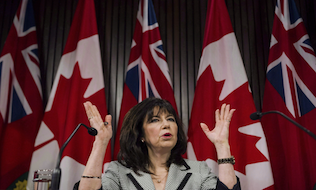

As Ontarians prepare for the upcoming provincial election campaign, the province’s auditor general is raising the stakes in her dispute with the government about its accounting treatment of two of its biggest public pension plans.
On Wednesday, auditor general Bonnie Lysyk released her report into the government’s budget projections ahead of the June election. In the report, she cast doubt on the government’s projections for upcoming budget deficits, suggesting the shortfalls will be much higher under what Lysyk suggests is the correct accounting treatment of the Ontario Teachers’ Pension Plan and the Ontario Public Service Employees’ Union (OPSEU) plan.
According to Lysyk, the government wrongfully recorded revenue from Ontario Teachers’ and insufficient pension expense from the OPESU plan. “It should not have done this because it does not have the unilateral legal right to reduce its future contributions to these plans or to withdraw any surplus from these plans without first reaching a formal agreement with the plans’ other joint sponsors,” Lysyk wrote in her report.
Read: Ontario pension accounting debate: Who’s right in the dispute over plan surpluses?
She added: “Since there is no evidence that minimum contributions will be reduced or any surplus withdrawn, the government continues to forecast making contributions to these plans of about $2.0 billion in 2018/19, $2.0 billion in 2019/20 and $2.1 billion in 2020/21. The result of the incorrect recording of pension revenues and expenses is an understatement of other program expenses in the pre-election report of $2.6 billion in 2018/19, $3.0 billion in 2019/20 and $3.2 billion in 2020/21.”
Lysyk said that while the government is forecasting the collection of $3.4 billion in revenues from Ontario Teachers’ until the end of March 2021, those amounts are neither accessible nor collectible in cash. “In fact, pension contributions are still required to be made by the province to the Ontario Teachers’ Pension Plan to match the contributions made by teachers,” she wrote.
“These payments are forecast to be $5.3 billion in cash outflows over the same three-year period.”
Read: Union agrees with auditor general on pension accounting conflict
Besides the pension issue, Lysyk also raised concerns about the government’s accounting treatment of its plan to reduce electricity prices last year. As a result of both the electricity changes and the treatment of the two pension plans, she predicted annual deficits would be much higher than predicted by the government in its budget last month: $11.7 billion instead of $6.7 billion in 2018/19, $12.2 billion instead of $6.6 billion in 2019/20 and $12.5 billion instead of $6.5 billion in 2020/21.
“When expenses are understated, the perception is created that government has more money available than it actually does,” wrote Lysyk.
“Government decision-makers might therefore budget more money to be spent on initiatives and programs, when that money is actually needed to pay for expenses the government has failed to record properly. Therefore, more money will need to be borrowed to pay for the unrecorded expenses even when government reports an annual surplus or a balanced budget.”
